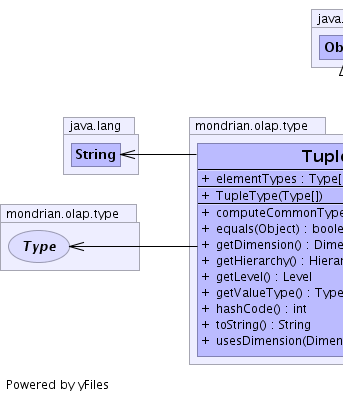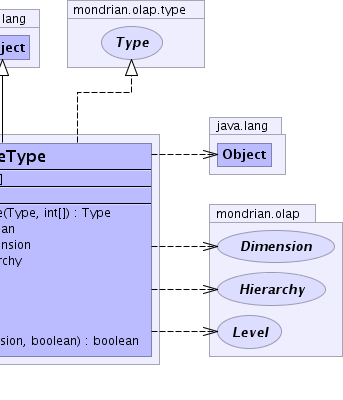 mondrian.olap.type.TupleType
mondrian.olap.type.TupleType
|
|||||||||
| PREV CLASS NEXT CLASS | FRAMES NO FRAMES | ||||||||
| SUMMARY: NESTED | FIELD | CONSTR | METHOD | DETAIL: FIELD | CONSTR | METHOD | ||||||||
java.lang.Objectmondrian.olap.type.TupleType
public class TupleType
Tuple type.
 |
 |
| Field Summary | |
|---|---|
Type[] |
elementTypes
|
| Constructor Summary | |
|---|---|
TupleType(Type[] elementTypes)
Creates a type representing a tuple whose fields are the given types. |
|
| Method Summary | |
|---|---|
Type |
computeCommonType(Type type,
int[] conversionCount)
Returns a Type which is more general than this and the given Type. |
boolean |
equals(Object obj)
|
Dimension |
getDimension()
Returns the Dimension of this Type, or null if not known. |
Hierarchy |
getHierarchy()
Returns the Hierarchy of this Type, or null if not known. |
Level |
getLevel()
Returns the Level of this Type, or null if not known. |
Type |
getValueType()
|
int |
hashCode()
|
String |
toString()
|
boolean |
usesDimension(Dimension dimension,
boolean definitely)
Returns whether this type contains a given dimension. For example: DimensionType([Gender]) uses only the
[Gender] dimension.
TupleType(MemberType([Gender]), MemberType([Store]))
uses [Gender] and [Store]
dimensions.
The definitely parameter comes into play when the
dimensional information is incomplete. |
| Methods inherited from class java.lang.Object |
|---|
clone, finalize, getClass, notify, notifyAll, wait, wait, wait |
| Field Detail |
|---|
public final Type[] elementTypes
| Constructor Detail |
|---|
public TupleType(Type[] elementTypes)
elementTypes - Array of types of the members in this tuple| Method Detail |
|---|
public String toString()
toString in class Objectpublic boolean equals(Object obj)
equals in class Objectpublic int hashCode()
hashCode in class Object
public boolean usesDimension(Dimension dimension,
boolean definitely)
TypeDimensionType([Gender]) uses only the
[Gender] dimension.TupleType(MemberType([Gender]), MemberType([Store]))
uses [Gender] and [Store]
dimensions.definitely parameter comes into play when the
dimensional information is incomplete. For example, when applied to
TupleType(MemberType(null), MemberType([Store])),
usesDimension([Gender], false) returns true because it
is possible that the expression returns a member of the
[Gender] dimension; but
usesDimension([Gender], true) returns true because it
is possible that the expression returns a member of the
[Gender] dimension.
usesDimension in interface Typedimension - Dimensiondefinitely - If true, returns true only if this type definitely
uses the dimension
public Dimension getDimension()
Type
getDimension in interface Typepublic Hierarchy getHierarchy()
Type
getHierarchy in interface Typepublic Level getLevel()
Type
getLevel in interface Typepublic Type getValueType()
public Type computeCommonType(Type type,
int[] conversionCount)
TypeSome examples:
If conversionCount is not null, implicit conversions
such as HierarchyType to DimensionType are considered; the parameter
is incremented by the number of conversions performed.
Some examples:
One use of common types is to determine the types of the arguments
to the Iif function. For example, the call
Iif(1 > 2, [Measures].[Unit Sales], 5)
computeCommonType in interface Typetype - TypeconversionCount - Number of conversions; output parameter that is
incremented each time a conversion is performed; if null, conversions
are not considered
|
|
||||||||
| PREV CLASS NEXT CLASS | FRAMES NO FRAMES | ||||||||
| SUMMARY: NESTED | FIELD | CONSTR | METHOD | DETAIL: FIELD | CONSTR | METHOD | ||||||||